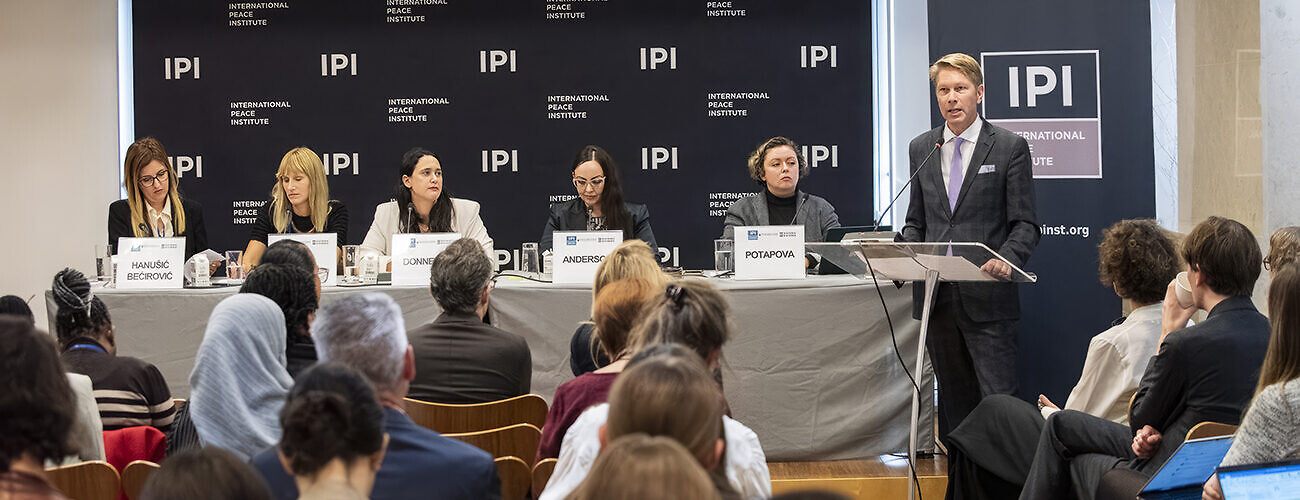In collaboration with the Kvinna till Kvinna Foundation and the Permanent Mission of Sweden to the UN, IPI convened a hybrid policy forum on the margins of the UN Security Council’s Open Debate on Women, Peace and Security (WPS) on October 25th. The event, entitled “The Role of Women’s Organizations in Combatting Gender-Based Violence in Conflict-Affected Contexts,” provided a platform for advocates, activists, and researchers to come together and discuss the role of women’s organizations in addressing conflict-related gender-based violence (GBV).
The world is currently grappling with the highest number of conflicts since WWII, marked by pervasive conflict-related GBV and rampant impunity for perpetrators. Panelists underscored the vital role of women’s organizations in combatting GBV in conflict settings. However, they also highlighted the dire need for increased funding and substantive support to allow these organizations to conduct advocacy and programming to end conflict-related GBV.
The event began with opening remarks from the Vice Minister for Multilateral Affairs, Ministry of Foreign Relations of Colombia, Elizabeth Taylor Jay, who spoke about Colombia’s experiences with implementing the WPS agenda in Colombia where “women and feminist movements and organizations have been the main protagonists.” Next, Ambassador and Deputy Permanent Representative of Sweden to the UN, Andreas von Uexküll, spoke about the danger of conflict-related sexual violence being the “world’s least condemned crime of war” and the need for member states to loudly condemn these crimes and support every avenue for justice.
Kvinna til Kvinna Foundation launched a new report, titled “They came together not to be silenced—gender-based violence in conflict & the role of women’s rights organizations” at the event. The report sheds light on the work of women’s organizations in four conflict-affected countries: Bosnia and Herzegovina, the Democratic Republic of the Congo, Iraq, and Ukraine.
Jessica Poh-Janrell, Advocacy Advisor of Kvinna till Kvinna, presented the report’s findings, identifying six themes of convergence among the four regions. She reported: “States have been unprepared, unable and, in some cases, unwilling to provide victims and survivors with sufficient support and hold perpetrators to account.” Women’s rights organizations have played an essential role in filling these critical gaps in services, yet they remain severely underfunded.
Panelists from several regions offered their perspectives on the context-specific challenges women’s organizations confront today and their implications for the international community’s response to GBV.
Adrijana Hanušić Bećirović, Senior Legal Adviser at Trial International in Bosnia and Herzegovina, spoke about how the war is still “omnipresent” in the hearts and minds of the victims in Bosnia and Herzegovina and a key part of the path to peace is establishing truth and providing justice for victims.
Oksana Potapova, Researcher and Women’s Rights Activist in Ukraine, drew attention to the continuum of violence that women endure and emphasized that GBV can serve as an early warning sign for conflict.
Solange Lwashiga, Executive Secretary Caucus des Femmes from the Democratic Republic of the Congo, spoke about the need to speak up to support change and the strategy of women’s organizations to break the silence around GBV in the Democratic Republic of the Congo.
Letitia Anderson, Special Representative of the Secretary-General on Sexual Violence in Conflict, grounded the discussion in the historical legacy of GBV within contexts of war. She articulated that sexual violence in conflict is a political issue and that it creates an undue burden on civil society to respond to these realities on the ground without political support.
All speakers made clear that gender equality and peace are inextricably linked and that gender-based violence is a political issue with a political economy.
Opening Remarks:
Elizabeth Taylor Jay, Vice-Minister for Multilateral Affairs, Ministry of Foreign Relations, Colombia
Andreas von Uexküll, Ambassador and Deputy Permanent Representative of Sweden to the UN
Speakers:
Jessica Poh-Janrell, Advocacy Advisor, Kvinna til Kvinna
Adrijana Hanušić Bećirović, Senior Legal Adviser at Trial International, Sarajevo, Bosnia & Herzegovina
Oksana Potapova, Researcher and Women’s Rights Activist, Ukraine
Solange Lwashiga, Executive Secretary Caucus des Femmes, Democratic Republic of the Congo
Letitia Anderson, Team Leader for Political Advocacy & Communications, UN Office of the Special Representative of the Secretary-General on Sexual Violence in Conflict
Moderator:
Phoebe Donnelly, Senior Fellow and Head of Women, Peace, and Security, International Peace Institute








